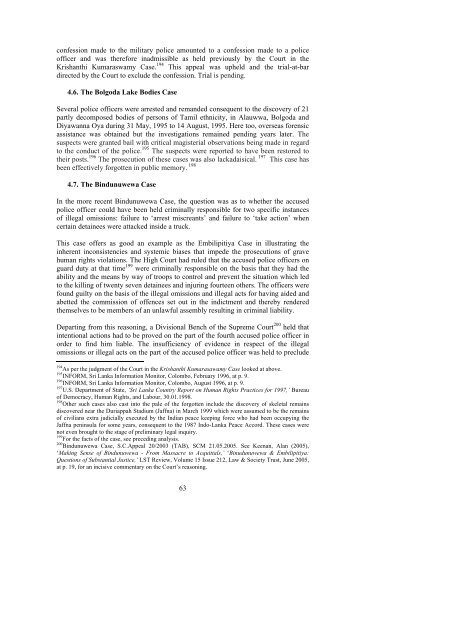Untitled - International Commission of Jurists
Untitled - International Commission of Jurists
Untitled - International Commission of Jurists
Create successful ePaper yourself
Turn your PDF publications into a flip-book with our unique Google optimized e-Paper software.
confession made to the military police amounted to a confession made to a police<br />
<strong>of</strong>ficer and was therefore inadmissible as held previously by the Court in the<br />
Krishanthi Kumaraswamy Case. 194 This appeal was upheld and the trial-at-bar<br />
directed by the Court to exclude the confession. Trial is pending.<br />
4.6. The Bolgoda Lake Bodies Case<br />
Several police <strong>of</strong>ficers were arrested and remanded consequent to the discovery <strong>of</strong> 21<br />
partly decomposed bodies <strong>of</strong> persons <strong>of</strong> Tamil ethnicity, in Alauwwa, Bolgoda and<br />
Diyawanna Oya during 31 May, 1995 to 14 August, 1995. Here too, overseas forensic<br />
assistance was obtained but the investigations remained pending years later. The<br />
suspects were granted bail with critical magisterial observations being made in regard<br />
to the conduct <strong>of</strong> the police. 195 The suspects were reported to have been restored to<br />
their posts. 196 The prosecution <strong>of</strong> these cases was also lackadaisical. 197 This case has<br />
been effectively forgotten in public memory. 198<br />
4.7. The Bindunuwewa Case<br />
In the more recent Bindunuwewa Case, the question was as to whether the accused<br />
police <strong>of</strong>ficer could have been held criminally responsible for two specific instances<br />
<strong>of</strong> illegal omissions: failure to ‘arrest miscreants’ and failure to ‘take action’ when<br />
certain detainees were attacked inside a truck.<br />
This case <strong>of</strong>fers as good an example as the Embilipitiya Case in illustrating the<br />
inherent inconsistencies and systemic biases that impede the prosecutions <strong>of</strong> grave<br />
human rights violations. The High Court had ruled that the accused police <strong>of</strong>ficers on<br />
guard duty at that time 199 were criminally responsible on the basis that they had the<br />
ability and the means by way <strong>of</strong> troops to control and prevent the situation which led<br />
to the killing <strong>of</strong> twenty seven detainees and injuring fourteen others. The <strong>of</strong>ficers were<br />
found guilty on the basis <strong>of</strong> the illegal omissions and illegal acts for having aided and<br />
abetted the commission <strong>of</strong> <strong>of</strong>fences set out in the indictment and thereby rendered<br />
themselves to be members <strong>of</strong> an unlawful assembly resulting in criminal liability.<br />
Departing from this reasoning, a Divisional Bench <strong>of</strong> the Supreme Court 200 held that<br />
intentional actions had to be proved on the part <strong>of</strong> the fourth accused police <strong>of</strong>ficer in<br />
order to find him liable. The insufficiency <strong>of</strong> evidence in respect <strong>of</strong> the illegal<br />
omissions or illegal acts on the part <strong>of</strong> the accused police <strong>of</strong>ficer was held to preclude<br />
194 As per the judgment <strong>of</strong> the Court in the Krishanthi Kumarasawamy Case looked at above.<br />
195 INFORM, Sri Lanka Information Monitor, Colombo, February 1996, at p. 9.<br />
196 INFORM, Sri Lanka Information Monitor, Colombo, August 1996, at p. 9.<br />
197 U.S. Department <strong>of</strong> State, ‘Sri Lanka Country Report on Human Rights Practices for 1997,’ Bureau<br />
<strong>of</strong> Democracy, Human Rights, and Labour, 30.01.1998.<br />
198 Other such cases also cast into the pale <strong>of</strong> the forgotten include the discovery <strong>of</strong> skeletal remains<br />
discovered near the Duriappah Stadium (Jaffna) in March 1999 which were assumed to be the remains<br />
<strong>of</strong> civilians extra judicially executed by the Indian peace keeping force who had been occupying the<br />
Jaffna peninsula for some years, consequent to the 1987 Indo-Lanka Peace Accord. These cases were<br />
not even brought to the stage <strong>of</strong> preliminary legal inquiry.<br />
199 For the facts <strong>of</strong> the case, see preceding analysis.<br />
200 Bindunuwewa Case, S.C.Appeal 20/2003 (TAB), SCM 21.05.2005. See Keenan, Alan (2005),<br />
‘Making Sense <strong>of</strong> Bindunuwewa - From Massacre to Acquittals,’ ‘Binudunuwewa & Embilipitiya:<br />
Questions <strong>of</strong> Substantial Justice,’ LST Review, Volume 15 Issue 212, Law & Society Trust, June 2005,<br />
at p. 19, for an incisive commentary on the Court’s reasoning.<br />
63
















